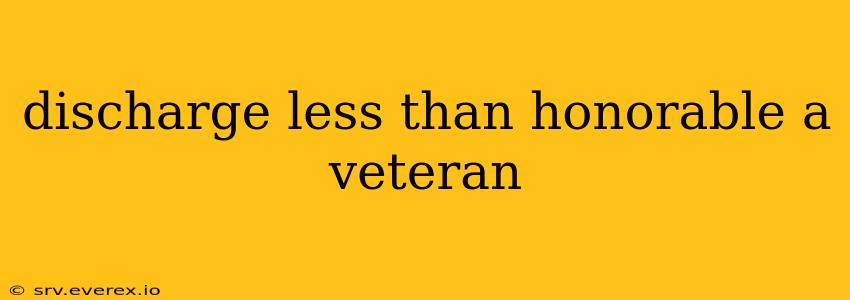A less than honorable discharge from the military is a serious matter with significant long-term consequences for veterans. Understanding the nuances of this type of discharge, how it differs from other discharges, and its implications is crucial for those affected and those seeking to support them. This article delves into the complexities surrounding less than honorable discharges, offering a comprehensive overview of their causes, effects, and potential avenues for recourse.
What Constitutes a Less Than Honorable Discharge?
A less than honorable discharge is the second most severe form of military discharge, falling only short of a dishonorable discharge. Unlike other discharges, like honorable or general discharges, a less than honorable discharge signifies a pattern of misconduct or serious failings during a veteran's service. This is a judgment made by a military court-martial or other administrative process, and it's not given lightly.
Common Reasons for a Less Than Honorable Discharge include:
- Multiple instances of serious misconduct: This might include repeated violations of the Uniform Code of Military Justice (UCMJ), such as assault, drug use, or insubordination.
- Conviction of a serious crime: A felony conviction, especially one involving moral turpitude, can often lead to a less than honorable discharge.
- Failure to meet minimum standards: Consistent failure to meet performance standards, coupled with other disciplinary actions, could result in this type of discharge.
- Desertion: While desertion can result in a dishonorable discharge, depending on the circumstances, it can sometimes lead to a less than honorable discharge.
The Impact of a Less Than Honorable Discharge
The consequences of a less than honorable discharge are far-reaching and can significantly impact a veteran's life. These consequences often extend beyond military service and affect various aspects of civilian life.
Key Impacts:
- VA Benefits: Veterans with less than honorable discharges are generally ineligible for most Department of Veterans Affairs (VA) benefits, including healthcare, disability compensation, and educational assistance. This can lead to significant financial and health hardships.
- Employment: Many employers view a less than honorable discharge negatively, potentially hindering employment opportunities. The stigma associated with this type of discharge can make finding and maintaining employment challenging.
- Housing: Access to certain housing programs and benefits may be restricted or unavailable.
- Loans: Obtaining loans, including mortgages and student loans, can be difficult due to the negative impact on creditworthiness.
- Licensure: Certain professional licenses and certifications may be unattainable or harder to obtain with this type of discharge.
Seeking Assistance and Potential Recourse
While the implications are severe, it's important to note that there are avenues for veterans to seek assistance and, in some cases, challenge the discharge.
- Legal Counsel: Consulting a military lawyer specializing in discharge upgrades is crucial. They can assess the circumstances of the discharge and explore potential options for appealing or upgrading the discharge.
- Board for Correction of Military Records (BCMR): This board reviews applications from veterans seeking corrections to their military records, including discharge upgrades. A successful application to the BCMR could lead to a change in discharge status, thereby opening doors to benefits and opportunities previously unavailable.
- Veteran Service Organizations (VSOs): Organizations like the Veterans of Foreign Wars (VFW), American Legion, and Disabled American Veterans (DAV) offer valuable support and assistance to veterans navigating the complexities of military discharges.
Conclusion
A less than honorable discharge is a significant challenge for veterans, impacting their access to benefits, employment, and overall quality of life. Understanding the implications and seeking appropriate legal and organizational support is crucial for veterans facing this situation. With diligent effort and professional guidance, some veterans may be able to improve their discharge status and secure the support they deserve. This article serves as an informational overview and should not be considered legal advice; seeking professional assistance is strongly recommended for any veteran seeking recourse.
